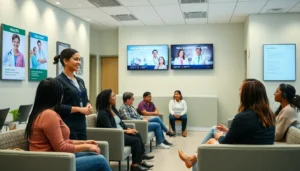Colorectal screening might not be the most exciting topic at the dinner table, but it’s a crucial conversation to have. Think of it as the superhero of preventive health—ready to swoop in and save the day before any trouble starts. With one in twenty people facing colorectal cancer, it’s time to put on those metaphorical capes and get screened!
Table of Contents
ToggleOverview Of Colorectal Screening
Colorectal screening plays a crucial role in detecting issues early, including colorectal cancer. This screening targets individuals starting at the age of 45, as recent guidelines recommend earlier screenings due to increased incidence rates among younger populations. Understanding different screening methods like colonoscopy, flexible sigmoidoscopy, and stool tests helps individuals choose what’s best for their health.
Screening can detect precancerous polyps, allowing for removal before cancer develops. Statistics show that one in twenty people will face colorectal cancer, highlighting the necessity for regular checks. Early detection significantly increases treatment success, making timely screenings essential.
Individuals with a family history of colorectal cancer or certain genetic syndromes may require even earlier screenings. Consultation with healthcare providers ensures tailored screening plans meet specific risk factors. Knowledge of signs such as unusual bowel habits or unexplained weight loss prompts timely medical evaluation.
Choosing to undergo colorectal screening empowers individuals. It encourages proactive health management, reducing the likelihood of severe health issues. Regular screenings, combined with a healthy lifestyle, further lower cancer risk. Prioritizing screenings facilitates better health outcomes for everyone.
Importance Of Colorectal Screening
Colorectal screening is critical for maintaining health and preventing significant disease. Detecting issues early can save lives.
Risk Factors For Colorectal Cancer
Aging increases the risk for colorectal cancer, with most cases occurring in individuals over 45. Family history plays a crucial role; individuals with relatives who had the disease face a higher risk. Genetic conditions, such as Lynch syndrome, further elevate the likelihood of developing colorectal cancer. Lifestyle choices significantly impact risk; obesity, sedentary behavior, smoking, and a diet low in fiber all contribute to increased odds. Additionally, certain racial and ethnic groups, including African Americans, show higher incidence rates, warranting more proactive screening measures.
Benefits Of Early Detection
Early detection sharply increases survival rates and treatment effectiveness. Identifying precancerous polyps during screening enables timely removal, preventing the progression to cancer. Screening allows for less invasive treatment options, improving recovery outcomes. Regular checks also provide peace of mind, reassuring individuals whether their health is within normal ranges. Furthermore, engaging in screening encourages ongoing health monitoring and lifestyle adjustments that benefit overall wellness. Waiting for symptoms to occur often leads to late-stage diagnosis, which significantly lessens treatment success. Prioritizing regular screenings fosters better health and longevity.
Types Of Colorectal Screening Tests
Colorectal screening tests play a crucial role in early cancer detection. Different methods exist, catering to various needs and preferences.
Colonoscopy
Colonoscopy serves as the gold standard for colorectal screening. This procedure allows for a comprehensive view of the entire colon and rectum. During a colonoscopy, a long, flexible tube with a camera examines the intestinal lining. Physicians can identify and remove polyps in real-time, reducing the risk of cancer development. Individuals typically start screening at age 45, but those with risk factors may need to begin earlier. The preparation involves a day of dietary restrictions and laxatives. Many find the process manageable, with a recovery period of a few hours post-procedure.
Flexible Sigmoidoscopy
Flexible sigmoidoscopy is another effective colorectal screening option. This test focuses specifically on the lower part of the colon and rectum. Unlike a colonoscopy, the preparation is less intense, requiring fewer dietary restrictions. The procedure takes about 20 minutes, making it convenient for patients. With this method, physicians can also detect polyps and signs of cancer. Screening typically begins at age 45, with some recommendations suggesting earlier assessments for high-risk individuals. Though not as comprehensive as a colonoscopy, flexible sigmoidoscopy serves as a useful alternative.
Fecal Occult Blood Test
Fecal occult blood tests (FOBT) provide a non-invasive option for colorectal cancer screening. This method detects hidden blood in the stool, signaling potential issues in the colon. Recommended annually for those 45 years and older, FOBTs require minimal preparation. Patients collect stool samples at home and send them to a lab for analysis. Quick results offer insight into potential risks, prompting further investigation if necessary. While FOBTs cannot directly detect polyps, identifying blood may indicate the need for additional testing like a colonoscopy. Regular adherence to this test can enhance early detection efforts.
Guidelines And Recommendations
Colorectal screening serves as a critical means of early detection in maintaining health. Established guidelines emphasize the necessity of regular screenings for optimal health outcomes.
Age And Frequency Recommendations
Individuals should begin colorectal screening at age 45, aligning with rising incidence rates among younger populations. Those with an average risk profile may opt for a colonoscopy every ten years. Alternatively, flexible sigmoidoscopies can occur every five years. The fecal occult blood test (FOBT) should be done annually to detect hidden blood. Individuals over 75 may continue screening if they remain in good health, as long as their life expectancy extends past five years.
Special Considerations For High-Risk Individuals
High-risk individuals require tailored screening strategies due to their elevated chances of colorectal cancer. Family history of colorectal cancer or precancerous polyps increases the urgency for earlier screening. Patients with genetic conditions such as Lynch syndrome should begin screenings at age 20 or ten years before the earliest diagnosis in the family. Lifestyle factors also necessitate additional assessments; for example, individuals who are obese or lead sedentary lifestyles may benefit from more frequent screening. Regular consultations with healthcare providers ensure that high-risk individuals follow the best practices for their specific circumstances.
Prioritizing colorectal screening is essential for maintaining health and preventing serious conditions. With one in twenty individuals facing colorectal cancer it’s crucial to take proactive steps. Regular screenings can lead to early detection of precancerous polyps and significantly improve treatment outcomes.
Individuals should be aware of their risk factors and adhere to recommended screening guidelines starting at age 45. Choosing the right screening method tailored to personal health needs can make a significant difference. By embracing regular check-ups and making informed lifestyle choices individuals can empower themselves to reduce their risk and enhance their overall well-being.



